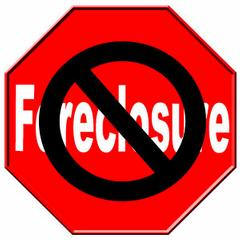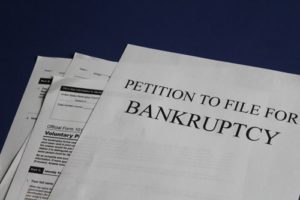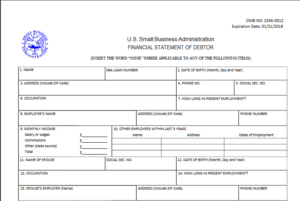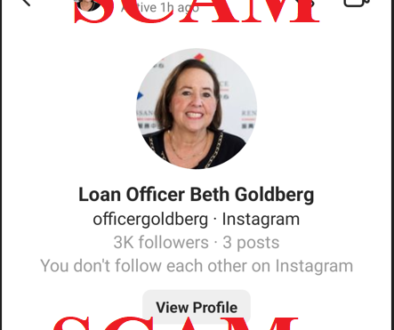Hey guys, I’ve written a bunch of “common questions” posts over the years, so I’m going to consolidate all the questions from past posts, including:
Common Questions About SBA Loan Forgiveness – Part 1
Questions About SBA Loan Forgiveness – Part 2
Common Questions About SBA Loan Guarantees
SBA Default – More Common Questions
SBA Default – Common Questions From Clients
Rather than make you click all over the universe, I’m going to update (where appropriate) and consolidate all the wisdom I’ve imparted over the years into a single article. If you want a step by step guide, check out my comprehensive guide to SBA default and Offer In Compromise. Enjoy!
1a) Is it possible to settle an SBA Disaster Loan?

It is possible to settle an SBA disaster loan, but I unfortunately no longer work with them.
1b) Is it possible to settle once an SBA loan is referred to the US Treasury?
Yes, but generally for unreasonable sums. For that reason, I no longer work with Treasury loans.
2) How long will it take to settle my loan?

It depends. There are many factors that can stall or delay the process. Did you sell the business equipment yet? Is there real estate that needs to be listed and sold? Is your lender still servicing the loan? Or has it been referred to SBA? Like a construction project, the rule of thumb is that it will always take longer anyone expects. But don’t despair, it is possible to settle you SBA loan. The SBA is fair, so if you understand the settlement rules, and understand how the SBA is going to evaluate your offer, your chances of settling are good provided you can raise an acceptable amount of cash.
3) What can an SBA workout specialist do for me that I can’t do for myself?
An effective SBA workout expert will have a strong knowledge of the SBA settlement process (duh). They will have a firm grasp of how the SBA will analyze your OIC package (PFS, tax returns, etc) in order to determine whether your offer is acceptable. In addition determining a reasonable offer range, an SBA workout expert will be able to challenge lenders who often don’t even understand the process themselves. Some lenders will cite specific SBA guidelines as reason why they declined your offer. A seasoned SBA workout expert knows the SBA rules, and can challenge the lender when they are factually incorrect. As a business owner who is going through the settlement process for the first time, nobody expects you to understand all the SBA rules and practices? More importantly, how would you know if you lender is correct when they cite certain SBA protocols?
4) Can they foreclose on my home if I default on an SBA loan?

They can foreclose on your home ( especially if it has equity in it) and you’ve pledged it as collateral. The SBA doesn’t want to kick people out of their homes, but if push comes to shove, they’ll do it. I’m always a but surprised that people don’t realize that when they pledge their home as collateral, foreclosure is on the table if they fail to make the payments.
5) Can they can shut down my business and sell all the business equipment?
Yes. If you want to pull the ostrich routine and pretend your business isn’t in trouble, the bank can go after the business assets without any cooperation from you. On the bright side, banks frequently do not spend the time and effort to shut a business down. This is especially true if the business is not asset intensive (i.e. a service business like a CPA firm).
6) What’s the most likely outcome if the bank sues me?
I’m not attorney, so this is not legal advice. I’m just sharing my experience as a workout officer. I’ll explain it as best I understood it, but please don’t rely on this. And don’t substitute it for competent legal counsel. They can get a personal judgment against you, which is basically the court saying “yeah, you owe the bank money”. A judgement against you means they can subpoena you for information. This basically means that you the court is making you tell them about your financial situation so they can take your stuff. If you don’t respond to the subpoena, in some states you could be arrested (note: I’ve never actually seen this happen. I did talk to a guy once who went to jail for lying under oath.)
7) Is my home in danger if I didn’t pledge it as collateral?

It could be. Even if you didn’t pledge your home to start with, in some states they can place a judgment lien on your property. Even if they can’t foreclose, it will remain there until you sell the property or refinance. There are some factors that can muddy the water, such as if you co-own the property with a non-guarantor spouse.
8) When I make a settlement offer, does it go through my lender or directly to the SBA?
It depends. Generally speaking, the lender continues to service the loan until the believe there is no chance of additional recovery. Once the lender reaches that point, the file is “wrapped up” and referred to the SBA. Once that happens, the borrower and guarantors will eventually get a 60 day letter. That letter doesn’t always mean that your lender is no longer involved in the negotiation. Confusing, I know. Sometimes you’ll deal directly with the SBA. Other times the SBA will refer you back to the original lender. If there is collateral remaining that has not been liquidated, that’s one reason why they may refer you back to your lender. So yeah, it depends.
9) My bank sucks. Can I just go over their head and deal directly with the SBA?
Unfortunately not. Until your bank closes their file, you’re stuck with them. Unless the bank is not responding or royally mucking up the process, the SBA will almost universally defer to the lender. The SBA pays lenders a fee to service SBA loans, and that includes negotiating the OIC.
10) The bank got their 75% back, so I just need to pay them the other 25%, right?
No, it doesn’t work like that. When the bank reimburses the lender, it just shifts the loss from the lender to the SBA. This means that you still owe 100% of the deficiency. It also means that every dollar the bank gets from you, they need to remit 75% of that dollar back to SBA.
11) If the SBA guarantee doesn’t get me out of my personal guarantee, why the hell did I bother with an SBA loan?
In theory, you took an SBA loan because you did not qualify for a conventional business loan. In order to incent the bank to lend to you, the SBA guaranteed the debt. So, it helped you GET the loan. It doesn’t get you OUT OF the loan.
12) My bank has not responded to my SBA settlement offer. Am I off the hook?
No, you are still going to face the music sooner or later. And trust me, you really want to deal with it sooner than later. Back in 2008, there were simply too many files and not enough workout people. I’ve heard from plenty of people who stopped paying years ago, then received a letter from the US Treasury. You’ll regret not dealing with it sooner when you see the 28% penalty they slap on your debt. You’ll REALLY regret it when they tell you they’ll only take 80% to settle, which amounts to the entire amount you originally owed.
13) My bank says that because my loan is guaranteed by the SBA, they cannot settle. Is that true?
Face palm. I’ve heard this amazing bit of hogwash enough times that I’ll address it. Of course you can settle an SBA loan. There is a whole process. If your lender is telling you this, either they have little or no SBA OIC experience, or they are just posturing.
14) If I file for personal bankruptcy, can the bank still legally come after my business and shut me down?

Yes. If you only file for personal bankruptcy, and the business assets are owned by the business (i.e. an LLC, S-Corp, C-Corp etc), the business is fair game. This assumes that the bank required your corporate entity to act as a borrower or guarantor, which is the case in 99.99% of cases. Having your personal guarantee discharged means you no longer have PERSONAL liability. So your personal assets (unless they were specifically pledged as collateral) such as your home, bank accounts, or paycheck are all safe. If the business assets are pledged as collateral for the SBA loan (the almost always are), they can still come after the business and it’s assets.
15) When I took this SBA loan, I formed a corporation. Doesn’t this shield me from personal liability?
If the corporation is the ONLY entity named as a borrower/guarantor, you are off the hook personally if the business is insolvent. But bankers know this fact too, so in every case I’ve ever seen, a personal guaranty is a requirement is you wish to obtain and SBA loan. When you sign that personal guarantee, you are essentially saying “if the business defaults on this loan, I will use my personal assets and income to repay this loan”.
Business owners sometimes tell me that they would have never taken the loan had they realized the the implications. First, your attorney should have explained it to you. Second if you refused to offer your personal guarantee, I will bet you a jellybean the bank would have lent you the money in the first place.
16) When I signed the personal guarantee, I thought I was signing as an officer of the company. Was I wrong?
Yes, you were wrong. If the document that you signed says “Unlimited Personal Guarantee”, you are personally liable.
17) Does my business need to file for bankruptcy in order to qualify for a settlement?
No, there is no SBA requirement stating that a business must file for bankruptcy. Just ceasing operations is sufficient. There may be other strategic reasons for filing a corporate BK (you’d have to ask a BK attorney), but doing it to qualify for an OIC is not one of them.
18) Will the bank be able to foreclose on my home if I file for personal chapter 7 bankruptcy?
It depends. Was there a lien on your home prior to the bankruptcy? If there WAS a lien, then the lien will not be extinguished. If there was NOT a lien before the bankruptcy, a BK will protect your home (assuming the bankruptcy is confirmed).
19) I met with a bankruptcy attorney. She recommended that I file for bankruptcy. Why should I try to try to settle instead?
I always answer this question the same way. Talk to me, talk to a BK attorney, then make an informed decision. Each approach will have it’s own pros and cons. There is no one right approach…your individual situation will often dictate which approach makes more sense. You just want to walk into your decision as well informed as possible.
20) The person at the bank told I should file for bankruptcy because the SBA will never release my personal guarantee. Is he correct?
That’s so overstepping their role, it leaves me virtually speechless. Your banker (who works for the bank, not you) should be doing their job, which is to collect money from you. When I was a bank VP department, I’d always tell borrowers that if they had legal or bankruptcy questions, they should speak with their attorney. Only a BK attorney should be advising you bankruptcy. It’s one thing to discuss the pros and cons of bankruptcy, it’s quite another to say “the only way to get out of this is to file for bankruptcy”.
21) What is your best SBA settlement advice?
The best piece of of advice? Simple. Be honest, transparent, and responsive. When you trying to settle your debt following a business failure, your lender and the SBA are seeking full disclosure. So what does this mean to you?
– Don’t “fudge” your Personal Financial Statement.
Leaving out major assets and income is the fastest way route to the Treasury. Lenders can pull credit reports and perform asset searches. Mortgages show up on credit reports. This means misreporting your mortgage balance so it appears that your home has no equity could backfire in a major way.
– If a “strategy” seems too good to be true, it probably is.
There are no legitimate loopholes. But there certainly is fraud. If you have a relationship with the buyer that doesn’t meet the definition of “arms length“, you’d better be disclosing it. YOU are the one signing your name on the Offer In Compromise Form, not your consultant. So when bank/SBA discovers you are trying to defraud them, it’s YOU who will be accountable.
– Play It Straight.
The whole point of the OIC is to settle because the personal guarantor truly can’t afford to pay it back. The SBA won’t settle because it’s inconvenient to make payments. There is nothing wrong with putting forth an argument about why you can’t afford to repay your lender/SBA in full. But be aware of how your spending decisions look from the bank and SBA’s perspective.
The failure of a business is a life changing event (in a bad way), no doubt about that. But by misrepresenting your situation, you risk making a bad situation much worse. You won’t be thrown in the slammer for borrowing money, making an honest effort, and not being able to pay it back. Plenty of people have gone to jail for committing fraud. Keep that in mind.
22) Can I sell my business to a friend, then take it back later?
You can, but if you are doing it to settle, it’s fraudulent.
23) How much can I settle for?
It depends on a slew of circumstances. There is no set formula because there are some items that are subjective. What constitutes a non-discretionary expense? How much equity is in your home (note: different banks have different formulas for that)? What is your future earning potential? How old are you? I could go on and on, but I think you get the point. But all those questions explain why I can’t give an answer without really diving in.
24) Will I ever be able to take another SBA loan if I settle?
Probably not. They’ll put you on the CAIVRS list.
25) Any tips for completing SBA Form 770?

Be thorough and accurate. This is not the time to be guessing and ball parking. If your situation is unclear or confusing, it’s certainly easier for them to decline the OIC than spend hours deciphering or trying to parse truth from the embellishments.
26) Any tips for completing SBA Form 1150?
Leave out the sad story. Be explicit about the facts, and how they support your offer. They are looking at making a business decision. Give them facts that support your offer. Show them what facts and figures you used to arrive at your offer.
27) Can I settle my SBA loan while the business is still open?
No. The business needs to cease operations. All business assets need to be sold. Only after that can you explore the SBA Offer In Compromise.
28) Can I get my personal guarantee released if I find a buyer for my business or commercial building?
The release of your personal guarantee only comes AFTER the sale of business/building is completed. You can’t present a buyer for your commercial building or business and expect them to release you as part of that transaction. Step 1: sell the business assets. Step 2: submit your OIC. I’ve seen people refuse to close a sale, thinking the bank and SBA would bend to their will. They didn’t.
29) Am I allowed to work in the same type of business in the future?
Yes. If you are a CPA, there is nothing to say you can’t continue to work as a CPA. The key here is that while you can continue to work in your chosen field, you can’t do is operate the same business with the same clients if you want to settle.
30) I was advised to “wait them out”, and I’ll get a better settlement. Good advice?
No, bad advice. The longer you wait, the more likely it is to end up at Treasury. I lovingly call Treasury the place where settlements go to die.
31) I have a business partner, and we both personally guaranteed the debt. Am I only liable for 50% of the debt?

In almost every case I can recall, all personal guarantors sign unlimited personal guarantees. This means that you are both 100% responsible for repayment of the debt. Therefore, they will have the right to pursue whoever they wish, in whichever order they see fit. If you are the partner who has all the money, you can bet they’ll pursue you more aggressively.
32) I personally guaranteed the loan as a favor to a friend/family member, but I had nothing to do with the business. Shouldn’t that count for something when they are considering my Offer In Compromise?
Not as far as the SBA is concerned. The asked for your personal guarantee because the business and business owners did not qualify for the loan by themselves. The lender required a guarantor who has resources to pay in a worst case scenario. A personal guarantee is a personal guarantee regardless of why you agreed to it.
33) I can’t reach anyone at my bank or the SBA. What should I do?
I would recommend reaching out to your congressperson. Each member of congress has a website. Keep it brief, and highlight the fact that you are getting no answers from anyone at the bank or SBA. They will not advocate for you, but they will reach out on your behalf. Someone at the bank/SBA will have to response to the congressional inquiry.


